
Leonard Goldberg, Producer of Hit TV Shows, Is Dead at 85
His partnership with Aaron Spelling gave the world “Charlie’s Angels,” “Fantasy Island” and many other series. On his own, he created “Blue Bloods.”
Leonard Goldberg, who produced the popular television series “Charlie’s Angels” and “Fantasy Island” with Aaron Spelling in the 1970s and late in life conceived the hit police drama “Blue Bloods,” died on Dec. 4 in a hospital in Los Angeles. He was 85.
His wife, Wendy Howard Goldberg, said the cause was injuries from a fall at his home.
For nearly 60 years, the suave and calm Mr. Goldberg found success as an executive with 20th Century Fox and ABC, where he helped establish the genre of weekly made-for-TV movies.
But he preferred the creative art of producing TV shows. Among the best-known Spelling-Goldberg productions was “Charlie’s Angels,” which became a pop-culture phenomenon and made a star of Farrah Fawcett-Majors as one of three beautiful female detectives. She left after the first season, but the show remained a hit.
As Mr. Goldberg neared his 80s, “Blue Bloods,” which proved to be his longest-running series, made its debut on CBS, in 2010. The show tells the story of the Reagans, a law-enforcement clan led by a New York City police commissioner, played by Tom Selleck. Mr. Goldberg created it as a hybrid of police procedurals, like “Starsky & Hutch,” another Spelling-Goldberg production, and “Family,” the company’s much-praised series about a middle-class family in California.
In developing a series about a strong-willed family that also includes two police officers and a prosecutor, Mr. Goldberg added an unsual touch: Every episode featured a post-church Sunday dinner, with the Reagans talking (and arguing) around the table.
“We had to have something singular, something that would crystallize all of my thoughts about what a family should be,” Mr. Goldberg told Shalom TV (now the Jewish Broadcasting Service) in 2014. “I came across the Norman Rockwell painting that celebrated Thanksgiving with a family, and I thought about my own upbringing, with our own Shabbat dinners.”
Mr. Selleck, in a phone interview, said that the weekly scene was inviolate to Mr. Goldberg, and that Mr. Goldberg had fought the network to retain it. (He sat on the CBS board for many years.)
“In our first encounter, I said, ‘Leonard, there’s this eight-page dinner scene that I love, but by the time the networks get it, it’ll be cut to two pages,’” Mr. Selleck said. “And he said, ‘No, that’ll be a set piece for the show.’”
He added, “We’re on episode 213, and anybody who talks about our show says their favorite part is the family dinner.”
Mr. Goldberg was born on Jan. 24, 1934, in Brooklyn. His father, William, made women’s coats and suits, and his mother, Jean (Smith) Goldberg, was a homemaker who also raised money for the B’nai B’rith and other charitable organizations.
After graduating from the Wharton School at the University of Pennsylvania in 1955 with a bachelor’s degree in economics, Mr. Goldberg spent six months in the executive training program at Bloomingdale’s. He disliked it and left after six months, finding a job at ABC in its research department. He then moved briefly to NBC before joining the advertising agency Batten, Barton, Durstine & Osborn.
He returned to ABC in the early 1960s and rose to vice president of daytime programming, introducing “The Dating Game” and “The Newlywed Game” to the lineup.
As Mr. Goldberg told it, he had prodded Chuck Barris, then ABC’s director of West Coast daytime programming, to create “The Dating Game,” in which a bachelor or bachelorette would choose a date from among three unseen members of the opposite sex after asking them questions.
As he recalled in an interview with the Television Academy Foundation in 2004, he told Mr. Barris: “What do young women like? We’re guys, we like girls. They must like guys.”
Mr. Goldberg became ABC’s vice president of programming in 1966. Over three years in that position he helped develop the made-for-TV movie format out of boredom, by his account, with conventional television series. He also introduced prime-time shows like “Love, American Style,” “The Flying Nun” and “The Mod Squad,” which Mr. Spelling produced with Danny Thomas.
Mr. Goldberg moved in 1969 to Screen Gems (which later became Columbia Pictures Television), where he was the vice president of production. While there, he read an excerpt in Look magazine from “I Am Third” (1970), the Chicago Bears running back Gale Sayers’s book about his friendship with his teammate Brian Piccolo, who died of cancer.
Mr. Goldberg recalled that he wept while reading the article. He called his former protégé at ABC, Barry Diller, and made a deal for Screen Gems to produce a TV movie based on the book, titling it “Brian’s Song.” Broadcast on ABC in 1971, it was the highest-rated TV movie that season and won five Emmy Awards.
After building Screen Gems into a more powerful force on television, Mr. Goldberg left in 1972 to collaborate with Mr. Spelling. It was a potent partnership that brought popular (if not critically acclaimed) series to ABC. They also produced 35 movies for television.
Mr. Goldberg recalled that his concept for “Fantasy Island” — about a mysterious tropical resort where visitors have unique adventures — emerged during a distracted moment in a meeting with ABC executives.
“I was looking out the window, and I was caught by the ABC vice president of programming, who said to me, ‘Are we boring you?’ I said, ‘A little bit,’” Mr. Goldberg told the academy. “And he said, ‘Where would you rather be?’ I said, ‘I’d rather be on a desert island with Charlie’s Angels.’”
“A lot of people have fantasies,” Mr. Goldberg added, “and that’s how it began.”
He parted with Mr. Spelling after a decade to produce theatrical films like “WarGames” (1983) and “Something About Amelia” (1984), a groundbreaking TV movie about incest starring Ted Danson and Glenn Close. That movie earned Mr. Goldberg his only Emmy Award, for outstanding drama or comedy special, which he shared with Michele Rappaport.
He was lured back into an executive position in late 1986, when Mr. Diller, who had become the chairman of Fox Inc., hired him to be president of 20th Century Fox. While Mr. Diller focused on the newly formed Fox network, Mr. Goldberg oversaw film and TV production.
“I’ve always wanted to run a movie studio,” he told The New York Times when his appointment was announced. “I’ve done almost everything else in this business.”
Films like “Broadcast News,” “Big,” “Die Hard” and “Working Girl” helped revive the studio, but Mr. Goldberg was unhappy with the bureaucratic details of running it. He preferred creating films and TV shows and resigned in early 1989.
Back on his own, he produced “Sleeping With the Enemy” (1991), “Love Letters” (1999), “Double Jeopardy” (1999) and other movies. He was also credited as an executive producer of the three theatrical “Charlie’s Angels” films, the most recent of which was released this year.
In addition to his wife, Mr. Goldberg is survived by his daughter, Amanda Goldberg Raskind; his stepsons, Richard and John Mirisch; five grandchildren; and his brother, Stanley.
The confidence that Mr. Goldberg and Mr. Spelling had in their ability to conceive a new series found an outlet even after their partnership had ended. One day they sat down to a lunch.
“I wonder if we could come up with a show by the end of lunch that we could sell to ABC,” Mr. Goldberg recalled Mr. Spelling suggesting to him. “I said, ‘Why not?’”
They thought of a series focused on young officers training at a police academy, then called an ABC executive from the restaurant. “We said: ‘A lot of people have the last Monet and the last Picasso. We’ll give you an opportunity to have one last Spelling-Goldberg production,’” Mr. Goldberg said in the academy interview.
ABC agreed. “T.J. Hooker,” starring William Shatner, made its debut in 1982.
For the 2000 film “Charlie’s Angels,” the director McG paid tribute to Mr. Goldberg by creating scenes from a faux “T.J. Hooker” movie, seen on an airplane movie screen.
Looking at the screen, a character played by LL Cool J sighs and says, “Oh, another movie from an old TV show.”
Richard Sandomir is an obituaries writer. He previously wrote about sports media and sports business. He is also the author of several books, including “The Pride of the Yankees: Lou Gehrig, Gary Cooper and the Making of a Classic.” @RichSandomir
74






